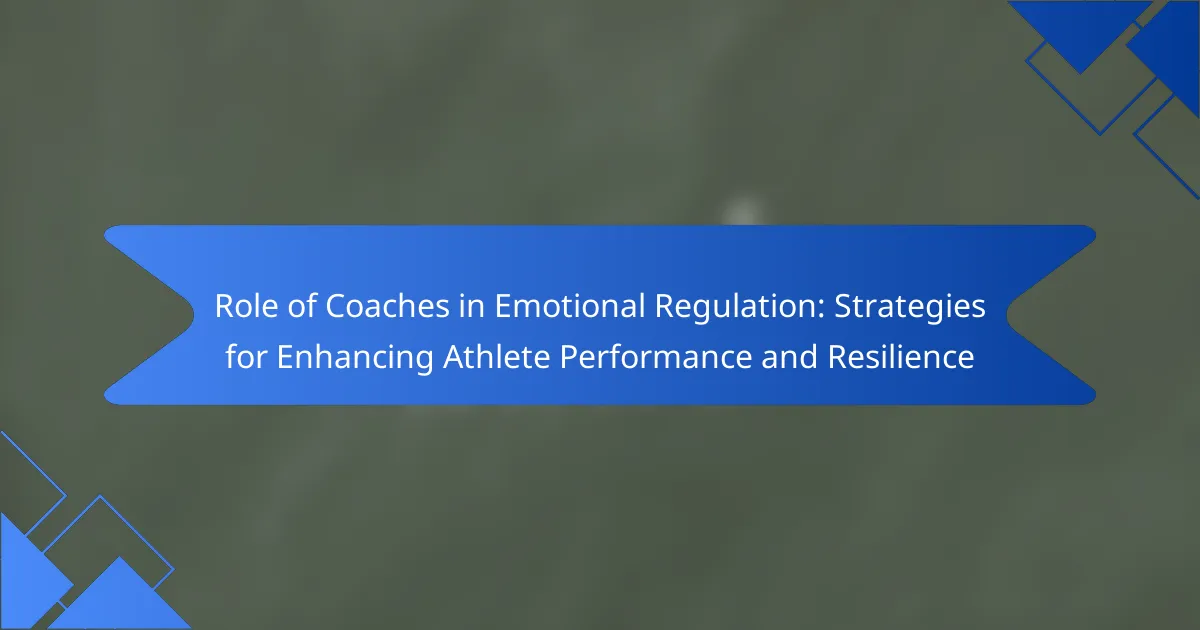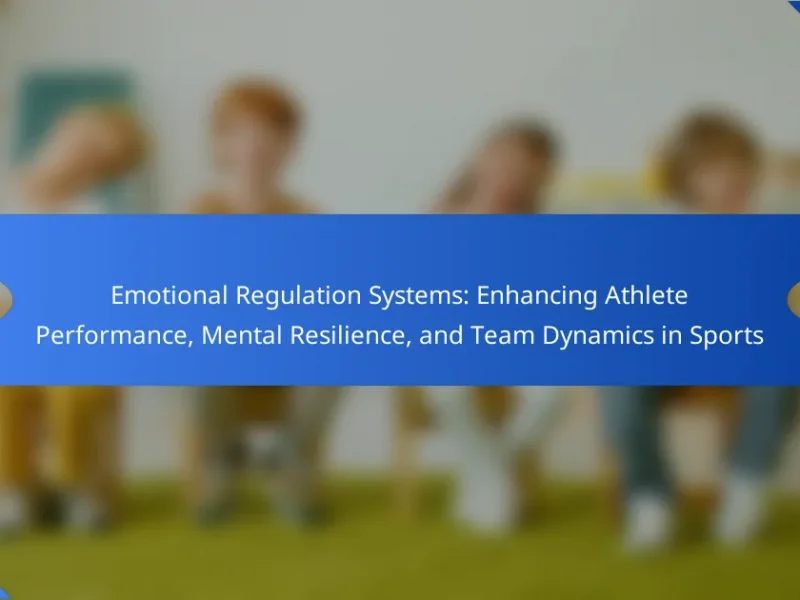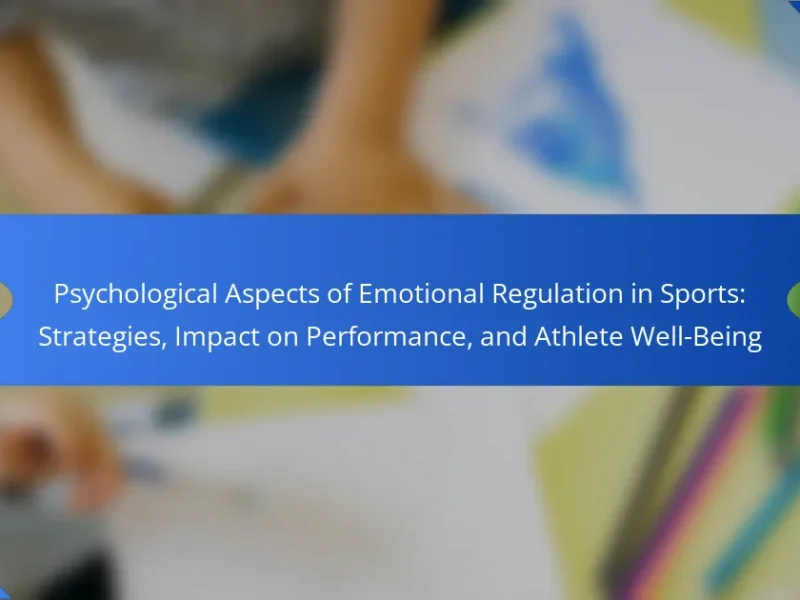Coaches play a crucial role in enhancing athlete performance and resilience through effective emotional regulation strategies. They teach coping mechanisms, promote self-awareness, and create supportive environments. Techniques such as mindfulness training and regular feedback sessions help athletes manage stress and express emotions. Additionally, modeling emotional regulation and fostering team-building activities strengthen relationships, contributing to overall emotional stability.
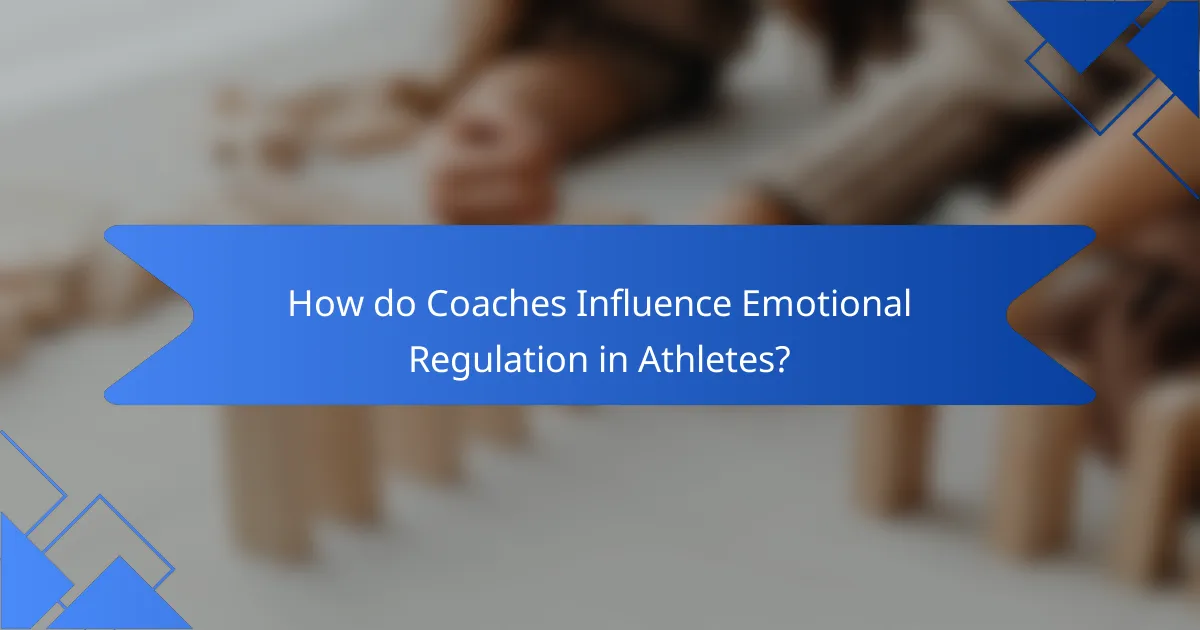
How do Coaches Influence Emotional Regulation in Athletes?
Coaches significantly influence emotional regulation in athletes through tailored strategies. They foster resilience and enhance performance by teaching coping mechanisms, promoting self-awareness, and creating supportive environments.
Coaches utilize techniques such as mindfulness training, which helps athletes manage stress and anxiety during competitions. Regular feedback sessions encourage open communication, allowing athletes to express emotions and receive guidance.
Moreover, coaches model emotional regulation themselves, demonstrating how to handle pressure. This unique attribute of leading by example reinforces positive emotional responses in athletes, enabling them to navigate challenges more effectively.
Incorporating team-building activities strengthens relationships among athletes, fostering a sense of belonging. This rare attribute of community support enhances emotional stability and encourages athletes to seek help when needed.
What are the key emotional regulation strategies used by coaches?
Coaches utilize several key emotional regulation strategies to enhance athlete performance and resilience. These strategies include fostering open communication, teaching mindfulness techniques, implementing structured routines, and promoting positive self-talk.
Open communication allows athletes to express their emotions, which can reduce anxiety. Mindfulness techniques help athletes stay present and focused, improving their emotional control. Structured routines create a sense of stability, enabling athletes to manage stress effectively. Positive self-talk encourages a constructive mindset, enhancing overall performance.
By integrating these strategies, coaches play a pivotal role in developing athletes’ emotional resilience and performance.
What role does communication play in emotional regulation?
Effective communication is crucial for emotional regulation, enhancing athletes’ performance and resilience. Coaches utilize communication strategies to foster a supportive environment, allowing athletes to express emotions openly. This approach helps in identifying emotional triggers and developing coping mechanisms. For instance, regular feedback sessions can improve self-awareness and emotional control. Additionally, non-verbal cues from coaches can reinforce positive emotional states, promoting mental toughness. Ultimately, effective communication empowers athletes to navigate challenges, leading to improved performance outcomes.
How can coaches model emotional regulation behaviors?
Coaches can model emotional regulation behaviors by demonstrating self-awareness and emotional control. They can use techniques such as mindfulness, active listening, and constructive feedback to enhance athlete resilience. For example, a coach can model deep breathing exercises during high-pressure situations to teach athletes how to manage stress. Additionally, sharing personal experiences of overcoming emotional challenges can create a supportive environment. This approach fosters trust and encourages athletes to adopt similar emotional regulation strategies.
What are the benefits of effective emotional regulation for athletes?
Effective emotional regulation enhances athletes’ performance and resilience by improving focus, reducing anxiety, and fostering a positive mindset. Coaches play a critical role by implementing strategies that promote emotional awareness and coping skills. For instance, mindfulness training can lead to better emotional control, allowing athletes to respond constructively under pressure. Additionally, emotional regulation helps in maintaining motivation and commitment, which are essential for long-term success in sports. Coaches can encourage open communication and provide feedback, creating an environment where athletes feel supported in managing their emotions.
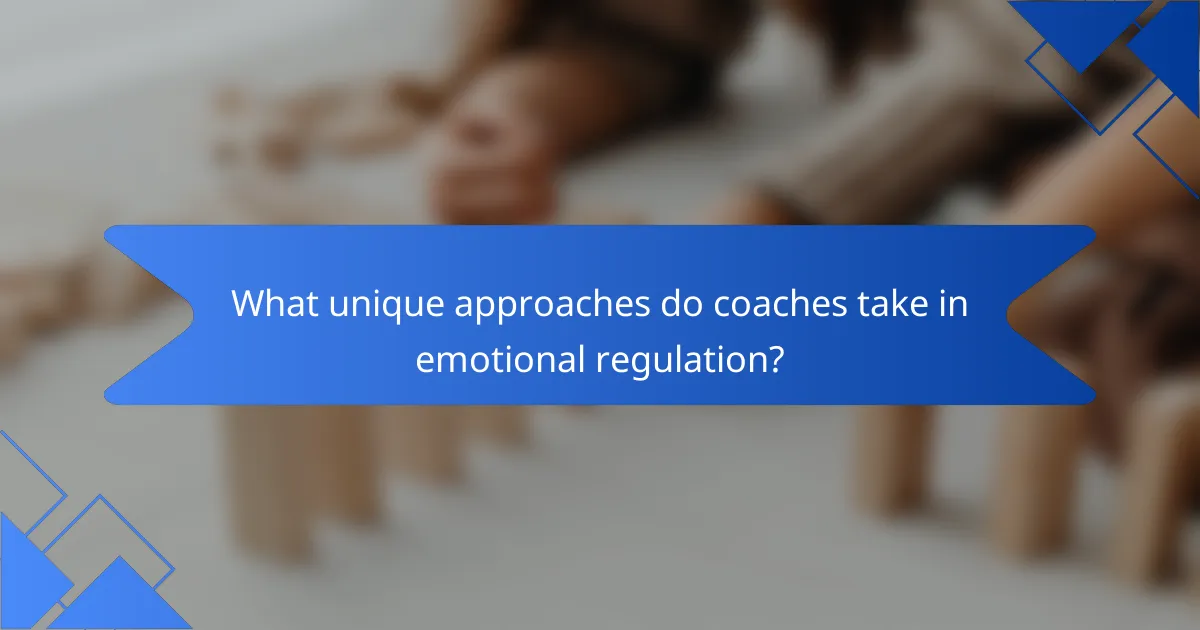
What unique approaches do coaches take in emotional regulation?
Coaches employ unique approaches in emotional regulation by integrating mindfulness practices, cognitive restructuring, and personalized feedback. Mindfulness techniques help athletes stay present, reducing anxiety. Cognitive restructuring encourages athletes to reframe negative thoughts, fostering resilience. Personalized feedback enhances self-awareness, allowing athletes to understand and manage their emotions effectively. These strategies collectively improve performance and emotional stability.
How can coaches personalize emotional strategies for individual athletes?
Coaches can personalize emotional strategies by assessing each athlete’s unique emotional needs and preferences. This involves using techniques like one-on-one discussions, emotional intelligence assessments, and tailored feedback methods. For example, some athletes may benefit from mindfulness practices, while others may respond better to motivational interviews. Understanding these root attributes allows coaches to enhance athlete performance and resilience effectively. Regular check-ins and adaptability in strategies further ensure that emotional support remains relevant and effective throughout the training process.
What techniques are effective for different personality types?
Different personality types respond to varied emotional regulation techniques. Coaches can enhance athlete performance by tailoring strategies to individual traits.
1. For analytical types, data-driven feedback and structured routines foster confidence and focus.
2. Expressive personalities benefit from open communication and collaborative goal-setting, enhancing motivation and engagement.
3. Supportive individuals thrive with encouragement and positive reinforcement, promoting resilience during challenges.
4. Competitive athletes respond well to challenge-based scenarios that stimulate their drive for achievement.
These tailored approaches improve emotional regulation and overall performance.
What role does team culture play in emotional regulation?
Team culture significantly influences emotional regulation by fostering a supportive environment. A positive team culture encourages open communication, which helps athletes express their emotions effectively. This emotional expression is crucial for managing stress and anxiety, enhancing overall resilience. Coaches can leverage team culture to implement strategies that promote emotional awareness, such as group discussions and team-building activities. These practices cultivate trust among team members, allowing athletes to seek support when facing challenges. Ultimately, a strong team culture not only aids in emotional regulation but also enhances performance by creating a cohesive and motivated group.

What are the universal attributes of emotional regulation in sports?
The universal attributes of emotional regulation in sports include awareness, control, adaptability, and resilience. Coaches play a pivotal role in fostering these attributes to enhance athlete performance.
Awareness involves recognizing emotions and their impact on performance. Control refers to managing emotional responses effectively. Adaptability allows athletes to adjust their emotional strategies based on situational demands. Resilience helps athletes recover from setbacks and maintain focus.
Coaches can implement strategies such as mindfulness training, emotional intelligence development, and constructive feedback to cultivate these attributes. By focusing on these universal attributes, coaches can significantly improve athletes’ emotional regulation and overall performance.
How does emotional regulation impact performance consistency?
Emotional regulation significantly enhances performance consistency by enabling athletes to manage stress and maintain focus. Coaches play a vital role in teaching strategies for emotional regulation, such as mindfulness and cognitive restructuring. These methods help athletes respond to challenges positively, leading to improved resilience and performance outcomes. Research indicates that athletes with strong emotional regulation skills demonstrate more stable performance under pressure, ultimately contributing to their success in competitive environments.
What common emotional regulation tools do coaches employ?
Coaches commonly employ various emotional regulation tools to enhance athlete performance. These include mindfulness techniques, cognitive restructuring, and emotional awareness training. Mindfulness helps athletes stay present and focused, reducing anxiety during competitions. Cognitive restructuring allows athletes to challenge negative thoughts, fostering a positive mindset. Emotional awareness training improves athletes’ ability to recognize and manage their emotions, leading to better decision-making and resilience.

What rare strategies can enhance emotional resilience?
Coaches can enhance emotional resilience through unique strategies such as mindfulness training, cognitive restructuring, and scenario-based simulations. Mindfulness training helps athletes focus on the present, reducing anxiety. Cognitive restructuring encourages positive thinking, enhancing coping mechanisms. Scenario-based simulations prepare athletes for high-pressure situations, building confidence and adaptability. These rare strategies collectively foster a supportive environment, promoting emotional regulation and overall performance.
How can mindfulness practices be integrated by coaches?
Coaches can integrate mindfulness practices by incorporating focused breathing exercises and guided visualization into training sessions. These techniques enhance emotional regulation, allowing athletes to manage stress and improve performance. Regular mindfulness check-ins can foster resilience, promoting a positive mindset during competitions. Additionally, coaches can model mindfulness by demonstrating their own practices, creating a culture of awareness and presence within the team.
What innovative technologies assist coaches in emotional regulation?
Innovative technologies that assist coaches in emotional regulation include wearable devices, mobile apps, and virtual reality. Wearable devices track physiological responses, providing real-time data on stress levels. Mobile apps offer mental training exercises and mindfulness resources, enhancing emotional awareness. Virtual reality simulations create immersive environments for practicing emotional regulation techniques. These tools empower coaches to support athletes in managing emotions, ultimately improving performance and resilience.

What are the common pitfalls coaches face in emotional regulation?
Coaches often face challenges in emotional regulation that can hinder athlete performance. Common pitfalls include inadequate self-awareness, failure to model emotional regulation, miscommunication with athletes, and neglecting individual athlete needs. These issues can lead to increased stress and decreased team cohesion, ultimately affecting performance. Addressing these pitfalls requires targeted strategies, such as enhancing emotional intelligence and fostering open communication.
What mistakes should coaches avoid when addressing athlete emotions?
Coaches should avoid dismissing athlete emotions, providing inadequate support, and failing to communicate effectively. Ignoring emotional responses can hinder performance and create a negative environment. Coaches must recognize the importance of emotional awareness and validation. Inadequate support can lead to increased stress and decreased resilience. Effective communication fosters trust and encourages athletes to express their feelings. Prioritizing these aspects enhances athlete performance and emotional regulation.
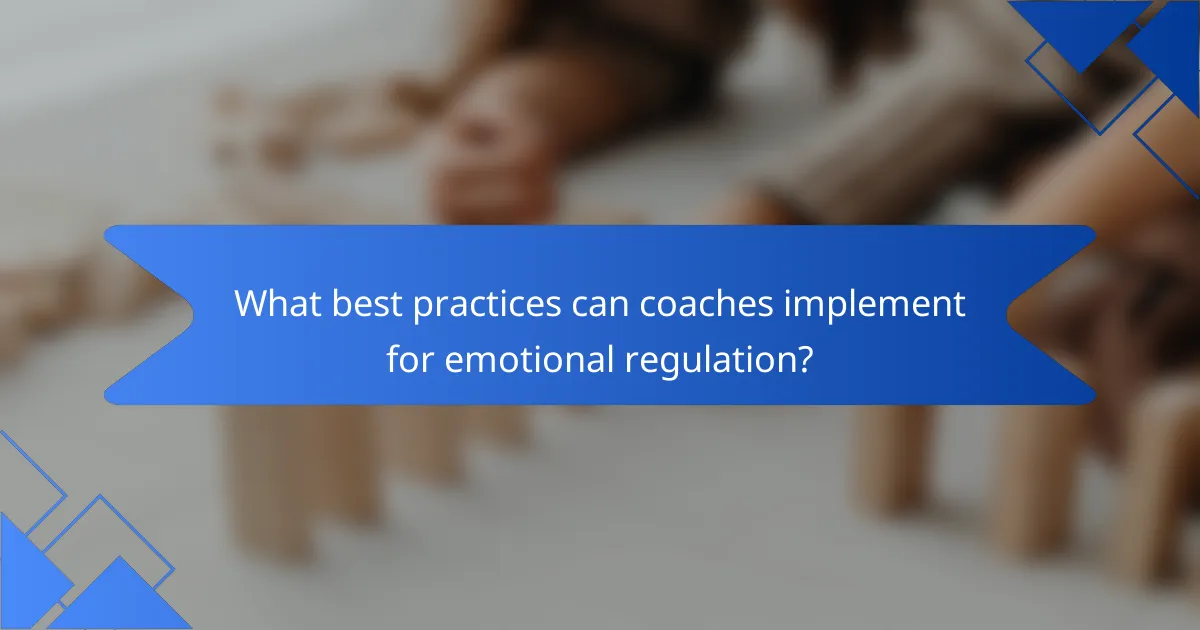
What best practices can coaches implement for emotional regulation?
Coaches can implement several best practices for emotional regulation to enhance athlete performance and resilience. These strategies include fostering open communication, teaching mindfulness techniques, and promoting a growth mindset.
Open communication allows athletes to express their feelings, which can reduce anxiety and build trust. Mindfulness techniques, such as breathing exercises, help athletes manage stress and maintain focus during competitions. Encouraging a growth mindset enables athletes to view challenges as opportunities for development, enhancing their emotional resilience.
Additionally, coaches can model emotional regulation by demonstrating self-awareness and coping strategies. This approach not only provides athletes with practical tools but also reinforces the importance of emotional health in sports.
How can coaches create a supportive environment for emotional growth?
Coaches can create a supportive environment for emotional growth by fostering open communication and trust. They should implement strategies that encourage self-expression and emotional awareness among athletes. Regular check-ins can help identify individual emotional needs, allowing tailored support. Additionally, promoting a growth mindset can enhance resilience and performance.
What ongoing training should coaches pursue to enhance their emotional regulation skills?
Coaches should pursue ongoing training in emotional intelligence, mindfulness, and stress management techniques to enhance their emotional regulation skills. These areas provide practical strategies to manage emotions effectively, fostering resilience in athletes.
1. Emotional Intelligence Workshops: These focus on recognizing and managing emotions, improving interpersonal skills.
2. Mindfulness Training: This practice enhances self-awareness and emotional control, benefiting both coaches and athletes.
3. Stress Management Courses: These teach techniques to cope with pressure, promoting a calm environment.
4. Communication Skills Seminars: Effective communication fosters trust and emotional safety, essential for athlete development.
5. Leadership Development Programs: These enhance decision-making and emotional support capabilities, crucial for guiding athletes.
Engaging in these training programs can significantly improve a coach’s ability to regulate emotions, ultimately benefiting athlete performance and resilience.
